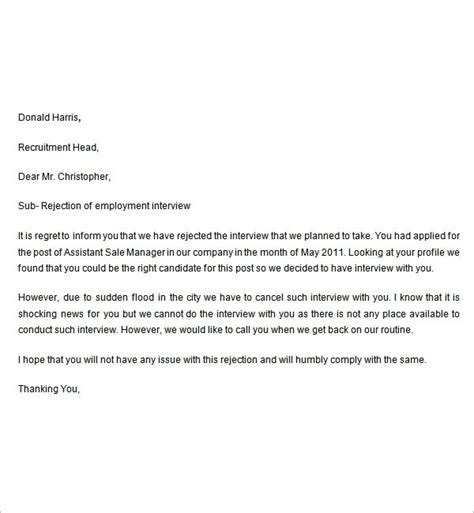Sample Rejection Letters Following An Interview: Examples In English

Receiving a rejection letter after an interview can be disheartening, but it’s important to remember that it’s not a reflection of your worth as a candidate. Employers have to make tough decisions, and unfortunately, not everyone can be hired. In this blog post, we’ll explore some sample rejection letters following an interview, and provide tips on how to handle the situation.
Why do employers send rejection letters?
Employers send rejection letters to inform candidates that they were not selected for the position. It’s a way of closing the loop on the hiring process, and providing closure for the candidate. In addition, it helps to maintain a positive impression of the company, even among candidates who were not selected.
The benefits of receiving a rejection letter
While it may not feel like it at the time, receiving a rejection letter can actually be beneficial for your job search. Here are some reasons why:
- It helps you move on: Knowing that you didn’t get the job allows you to focus your energy on other opportunities.
- It provides feedback: Some employers may offer feedback on your interview performance, which can be helpful for future interviews.
- It maintains a positive relationship: Even if you weren’t selected for this particular position, you may be a good fit for a future role at the company. Maintaining a positive impression can increase your chances of being considered for future opportunities.
Sample rejection letters
1. Standard rejection letter
Dear [Candidate Name],
Thank you for taking the time to interview for the [Position] role at [Company Name]. We appreciate your interest in the position, and appreciate the effort you put into your application and interview. After careful consideration, we have decided not to move forward with your candidacy.
Please know that this decision was not a reflection of your qualifications or experience. We received a large number of highly qualified applicants, and unfortunately, we were not able to proceed with all of them.
We encourage you to continue to apply for positions at [Company Name]. We value your interest in our organization, and wish you all the best in your job search.
Thank you again for your time and effort. We hope that you will keep in touch with us in the future.
Sincerely,
[Your Name]
[Your Title]
2. Personalized rejection letter
Dear [Candidate Name],
Thank you for taking the time to interview for the [Position] role at [Company Name]. We appreciate your interest in the position, and were impressed by your [specific skill or quality] during the interview.
After careful consideration, we have decided to move forward with another candidate who we believe is the best fit for the role at this time. While we were impressed with your experience and qualifications, we ultimately had to make a difficult decision.
We encourage you to continue to apply for positions at [Company Name]. We value your interest in our organization, and believe that you would be a strong candidate for future opportunities.
Thank you again for your time and effort. We wish you all the best in your job search.
Sincerely,
[Your Name]
[Your Title]
How to respond to a rejection letter
1. Take time to process your emotions
Receiving a rejection letter can be tough, and it’s okay to take some time to process your emotions. Allow yourself to feel disappointed or frustrated, but try not to dwell on it for too long. Remember that this is just one opportunity, and there will be others.
2. Ask for feedback (if offered)
If the employer offered feedback on your interview performance, take them up on the offer. Constructive feedback can be helpful in identifying areas where you can improve for future interviews.
3. Thank the employer for their time
Regardless of whether or not you agree with the employer’s decision, it’s important to thank them for their time and consideration. This shows that you are professional and gracious, and can leave a positive impression.
4. Keep in touch
If you’re interested in future opportunities at the company, let the employer know. You can ask to be added to their candidate database, or express your interest in other positions that may become available.
FAQs
1. Should I respond to a rejection letter?
It’s not necessary to respond to a rejection letter, but it can be a good opportunity to maintain a positive relationship with the employer. Thank them for their time and consideration, and express your continued interest in future opportunities.
2. Can I ask for feedback if it’s not offered?
It’s okay to ask for feedback, but be prepared for the possibility that the employer may not be able to provide it. They may have legal or policy restrictions that prevent them from sharing feedback, or they may simply not have the time or resources to provide it.
3. How long should I wait before following up after a rejection?
It’s generally not advisable to follow up immediately after receiving a rejection letter. Give the employer some time to process their decision and complete the hiring process. If you’re still interested in future opportunities, you can reach out to the employer after a few weeks or months to express your continued interest.
In conclusion
Receiving a rejection letter after an interview can be tough, but it’s important to remember that it’s not a reflection of your worth as a candidate. Employers have to make tough decisions, and unfortunately, not everyone can be hired. By handling the situation professionally and graciously, you can maintain a positive relationship with the employer and increase your chances of being considered for future opportunities.
